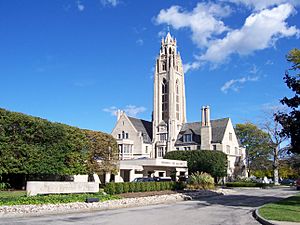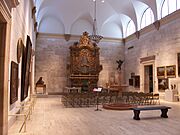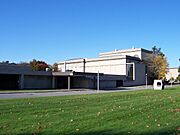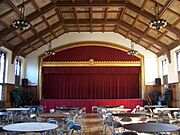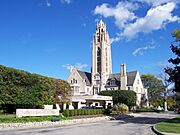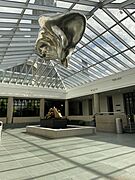Memorial Art Gallery facts for kids
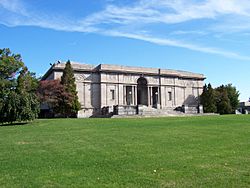
South facade of the main gallery
|
|
| Established | 1913 |
|---|---|
| Location | 500 University Ave Rochester, NY 14607 |
| Type | Art museum |
| Collection size | 12,000 works of art |
| Visitors | 238,082 (2017 - 2018) |
| Public transit access | Stop #3 (University Avenue/Prince Street) RTS route 18/19 - 18X/19X University |
The Memorial Art Gallery is a public art museum located in Rochester, New York. It opened in 1913 and is part of the University of Rochester. The museum is a very important place for art in the region. It hosts special art shows like the Rochester-Finger Lakes Exhibition and the yearly Clothesline Festival.
Contents
The Story of the Memorial Art Gallery
How the Museum Started
The Memorial Art Gallery was built to remember James George Averell. He was the grandson of a well-known person named Hiram Sibley. James passed away when he was only 26 years old. His mother, Emily Sibley Watson, wanted to create a special public place to honor him.
At the same time, Rush Rhees, who was the president of the University of Rochester, was looking for people to donate money. He wanted to help build up the university's campus. As early as 1905, Rhees had already drawn a map of the campus that included a dedicated art gallery.
The Rochester Art Club, a group for art lovers in the area, also supported the idea of a new gallery. This club had shown art and taught classes at other places in the city.
Opening the Gallery
The Gallery officially became a part of the University of Rochester in 1912. It has its own board of directors who look after its art collection and programs. Rush Rhees put together the first board in November 1912. The Gallery then opened its doors to the public on October 8, 1913.
The very first art show was put together by George L. Herdle, the president of the Art Club. It featured paintings by American artists of that time. Many of these paintings were for sale. The Gallery did not have money to buy art at first. So, people would buy paintings from the shows and then give them to the Gallery. This is how the museum started its permanent collection. Some of the first important artworks included [Golden Carnival] by Willard Metcalf and [Oxen on the Beach] by Joaquín Sorolla.
Growing the Collection and Leadership
George Herdle planned many exciting art shows, with new ones almost every month. A special exhibition in 1914 showed the original Kodachrome two-color photography process. In 1919, there was a solo show by George Bellows that caused some discussion. The Rochester Art Club also held its yearly shows at the Gallery.
In the early years, wealthy Rochester families like George Eastman and the Sibleys would lend their art for summer shows. This helped the Gallery display more art.
When George Herdle passed away in 1922, his daughter, Gertrude L. Herdle, took over. She became the museum's director and worked there for 40 years! Her other daughter, Isabel C. Herdle, also joined the museum in 1932. She worked in different roles, helping to care for the art.
Today, the Gallery gets most of its support from its members and the University of Rochester. It also receives money from Monroe County and the New York State Council on the Arts.
Amazing Art Collections
The Memorial Art Gallery has a huge collection of over 13,000 artworks! These include paintings by famous artists like Monet, Cézanne, Matisse, Homer, and Cassatt. It also has works by modern artists such as Wendell Castle, Albert Paley, and Helen Frankenthaler.
Some of the interesting artworks you can find there include:
- Blue Prism Painting I by Josiah McElheny, made in 2014.
- Breaking the Pose by Jerome Witkin, from 1986.
- Colonel Nathaniel Rochester by John James Audubon, painted before 1831.
- Creation Myth by Tom Otterness, from 2011-2012.
- Dawn's Landscape XL by Louise Nevelson, created in 1975.
- Harem Scene by Daniel Israel, from 1895-1900.
- Interior of a Mosque by Jean-Léon Gérôme, from 1890-1899. This is the only painting from Hiram Sibley's first collection that the Gallery still owns.
- Morning on the River by Jonas Lie, from 1911-1912.
- Peeling Onions by Lilly Martin Spencer, around 1852.
- Portrait of a Young Man in an Armchair by Rembrandt Harmensz van Rijn, around 1660.
- Seer by Helen Frankenthaler, from 1980.
- Statue of Venus Obliterated by Infinity Nets by Yaoyi Kusama, from 1998.
- The Apparition of the Virgin to St. Hyacinth by El Greco, around 1605-1610. This was the first artwork bought with money from the Gallery's Marion Stratton Gould fund.
- The Clown by George Condo, from 2010.
- The Rocks at Pourville, Low Tide by Claude Monet, from 1882.
- The Wanderer by George Grosz, from 1943.
- Woman Fixing Her Hair by Elizabeth Catlett.
Getting Involved with the Community
The Gallery does more than just host art shows. It also offers classes and educational programs. Plus, it puts on two big events: the Rochester-Finger Lakes Exhibition and the Clothesline Festival.
Rochester-Finger Lakes Exhibition
This art show happens every two years. Artists from the 27 westernmost counties of New York can enter their artwork. Famous art experts, like Charles E. Burchfield and former museum directors, have been judges. Past winners include artists like Wendell Castle and Albert Paley. This exhibition started in 1938. It grew out of the Rochester Art Club's yearly shows, which began at the Gallery in 1914.
Clothesline Festival
The Clothesline Festival is a fun outdoor art show. Visitors can buy artwork directly from artists from all over New York state. There's also live entertainment and activities for families. The Gallery started this festival in 1957. It quickly became very popular and helps the Gallery earn money to support its programs.
Gallery Spaces
-
Interior of the Vanden Brul pavilion with sculptures by Henry Moore and Iñigo Manglano-Ovalle
See also
- List of university art museums and galleries in New York State
 | William Lucy |
 | Charles Hayes |
 | Cleveland Robinson |


